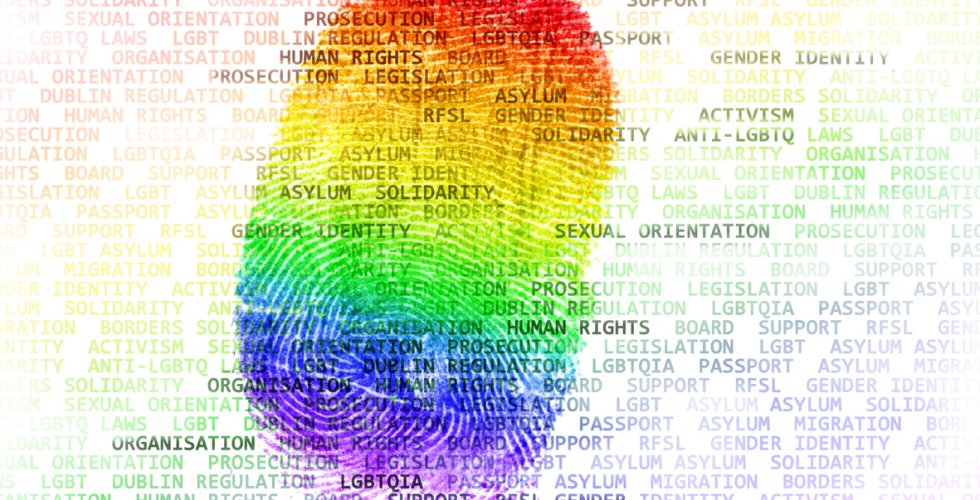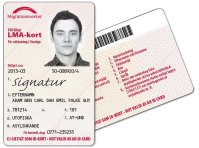
Quick facts: the law and the asylum process
Here we have briefly gathered overall information about the different steps of the asylum process and relevant legislation. We also offer advice and tips on how to go about your asylum case as an LGBTQI person; how you can influence the process and what rights and obligations you have as an asylum seeker.
Important terminology
The Swedish Migration Agency handles all asylum cases. The regulations governing who is eligeble for asylum are stated in the UN Convention Relating to the Status of Refugees and in the Swedish Aliens Act. The information on this page can be found at the Migration Agency’s website.
Asylum seeker
An asylum seeker is someone who has come to Sweden to seek protection (asylum) and is still in the asylum application process.
Grounds for asylum
Sweden has signed the UN Convention Relating to the Status of Refugees (hereafter “the refugee convention”). That means that each asylum seeker’s asylum application is to be treated individually. In this process, the asylum seeker’s sexual orientation and gender identity and/or gender expression should be taken into account.
Sweden should grant residence permit to people who are refugees according to the refugee convention, but also to people who are eligible for subsidiary protection according to the EU’s common rules and the Swedish Aliens Act.
Refugee
According to the refugee convention, Swedish law and EU regulations, a refugee is someone who has well founded reasons to fear persecution due to:
- Race
- Nationality
- Religious or political beliefs
- Gender
- Sexual orientation
- Affiliation to a particular social group
The persecution can come from state authorities, or state authorities may be unable or unwilling to provide protection from persecution by individuals or groups.
If you qualify as a refugee, you will be granted a refugee status declaration, which is an internationally recognised status, based on the refugee convention as well as EU regulations. Persons with a refugee status declaration are normally given a residence permit for three years.
Subsidiary protection
If you don’t qualify as a refugee, you might be considered to be in need of subsidiary protection, and may receive a subsidiary protection status declaration based on EU regulations. A person deemed in need of subsidiary protection is someone who:
- is at risk of being sentenced to death,
- is at risk of being subjected to corporal punishment, torture or other inhumane or degrading treatment or punishment, or
- as a civilian, is at serious risk of injury due to armed conflict.
Persons with a subsidiary protection status declaration are normally given a residence permit for 13 months.
Others in need of protection
In exceptional cases, asylum seekers may be granted a residence permit even if they do not need protection from persecution. This requires extraordinary circumstances directly linked to their personal situation, (for example, people with very serious health issues or people subjected to human trafficking) implying that a decision to deny residence permit would conflict with Sweden’s international obligations.
Residence permit for those granted refugee status
If you have been granted refugee status will be given a three-year residence permit. If you are able to support yourself by the time your residence permit expires you can be granted a permanent residence permit.
Seeking asylum as an LGBTQI person
If you have a well-founded fear of persecution because of your sexual orientation, gender, gender expression, gender identity or affiliation to a particular social group, you may qualify as a refugee and have the right to receive protection in Sweden. This is stated in the refugee convention, Swedish law and EU’s regulations.
How do I seek asylum?
You need to be in Sweden or at the Swedish border to apply for asylum. The police is in charge of the border control in Sweden, making sure that travellers have the right to enter the country by checking that they have valid passports.
In many cases a traveller can enter Sweden without passing a border control. That is because Sweden, as most other EU countries, are part of the Schengen agreement. All people who have the right to enter a country in the Schengen area can travel freely across the borders of other Schengen countries. At the border towards countries outside of the Schengen area, however, the traveller’s documents are thoroughly examined.
If a person seeks asylum at the border, the police will refer the case to the Swedish Migration Agency.
Making an application
As stated above, you should seek asylum at the Swedish border. However, if you’ve already entered the country you can apply at any of the Migration Agency’s intake units located in Gävle, Göteborg, Malmö, Märsta, Norrköping and Stockholm.
The Migration Agency will determine if Sweden should process your application for asylum or if another country has the obligation to do so (so called “Dublin cases”). If it’s obvious that there’s a lack of grounds for asylum the Migration Agency can make a quick decision, for example if you’re a citizen of another EU country.
You will have many meetings at the Migration Agency during your initial time in Sweden. It’s important that you go to all the appointments that the Migration Agency makes for you. It’s also a good idea to find out what your rights and obligations are beforehand in order to get a fair and legally secure asylum process. RFSL Newcomers can support you by providing information in legal matters, as well as offer counselling.
The importance of a good public counsel
You will be appointed a public counsel to represent you in your asylum process. Not all public counsels have LGBTQI competency and many lack knowledge about LGBTQI issues. This can negatively affect your chances of a fair asylum investigation process. If you contact RFSL Newcomers before or early on in your asylum process, you can receive support in finding a public counsel with LGBTQI competency. RFSL’s asylum lawyer Aino Gröndahl acts as public counsel in asylum cases for LGBTQI people, and you can request to have Aino Gröndahl as your public counsel at the Migration Agency.
The asylum investigation
Nobody knows why you have left your home country better than you. In order for the Migration Agency to be able to perform a proper assessment of your grounds for asylum it’s important that you disclose everything that has happened to you in your country right from the start. As an LGBTQI person you should inform the Migration Agency about your LGBTQI identity at the first meeting. In Sweden it is possible to seek asylum on the grounds that you are an LGBTQI individual if you suffer persecution in your home country.
The Migration Agency will ask you questions about your identity. You are to bring your passport or other identification documents. The documents should state your name, your date of birth and your citizenship. You are expected to explain why you are seeking asylum and what has happened to you. Some things may be difficult to talk about, but that information could be extremely valuable for your case. If you need to, you may request a break during the investigation. You can always bring evidence to support your story, or information about your country, to the investigation.
According to Swedish law it’s the asylum seeker and their public counsel who are responsible for presenting evidence to support the asylum investigation.
Choosing accommodation
The Migration Agency offers housing to asylum seekers which is free of charge. The housing offered by the Migration Agency is either in an apartment, in a normal housing area or at a centre.
The asylum seeker runs their own household. Families might have to share an apartment with other people, and single people might have to share a room. More than half of those who seek asylum in Sweden choose to find their own accommodation, for example with friends or family.
What can I do if I’m subject to discrimination, harassment and violence where I live?
At Newcomers, we often meet LGBTQI asylum seekers who have been subject to discrimination, harassment, threat and violence at the centres that house asylum seekers. If you have been subject to any form of discrimination, harassment, threat or violence or if you don’t feel safe at the housing provided by the Migration Agency you can contact us at Newcomers.
Living in Sweden as an asylum seeker
LMA card
Everyone who seeks asylum in Sweden will receive a card that shows that they are asylum seekers — an LMA card (LMA stands for “lagen om mottagande av asylsökande”, or the “Act on Reception of Asylum Seekers”). It is not an identity (ID) card, but proof that you are an asylum seeker who is allowed to remain in Sweden while you wait for a decision on your application. You must always carry your asylum seeker card. This is especially important when you visit medical care services, for example, or buy medication prescribed to you, as you will pay a lower price if you show your asylum seeker card.
Financial aid
Asylum seekers with their own funds should pay for their own expenses. If an asylum seeker is without funds they can apply for a daily allowance to cover the cost of food, clothes, telephone, hygiene, daily papers, leisure activities etc. The daily allowance is:
- 71 SEK/day for adults
- 61 SEK/day co-habitants
- 37-50 SEK/day for children (0-17 years old, the allowance is halved as from the third child)
The daily allowance may be lowered if the asylum seeker is in hiding or disrupts the asylum investigation.
Asylum seekers’ right to care
The county councils provide healthcare for asylum seekers. They are compensated by the state, through the Migration Agency.
All asylum seekers in Sweden are offered a medical exam which is free of charge. Adult asylum seekers in need of emergency care pay a patient’s fee of 50 SEK. The price for prescription medication is 50 SEK and the price for patient transport is no more than 40 SEK .
Asylum seeking children have the same rights to healthcare and dental care as any other child in Swedish society.
Custody
Asylum seekers and other foreigners can sometimes be taken into custody, i.e. be imprisoned. People are taken into custody in order for them to be available for investigation or in connection to their departure from Sweden.
It might be necessary to take an asylum seeker into custody in order to investigate their identity. It may also be warranted when someone is to be deported. However, this method can only be used if the authorities believe that the person is likely to go into hiding. Children are rarely taken into custody, and then only along with their parents. When in custody you will be able to participate in activities, be outdoors and receive visitors.
Instead of taking someone into custody, the asylum seeker can sometimes be asked to hand in their passport to the police and report to the police station at regular intervals.
Contact Newcomers
Email: newcomers@rfsl.se

